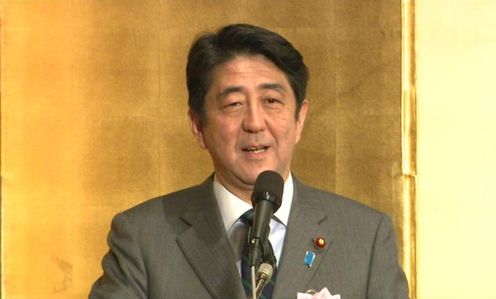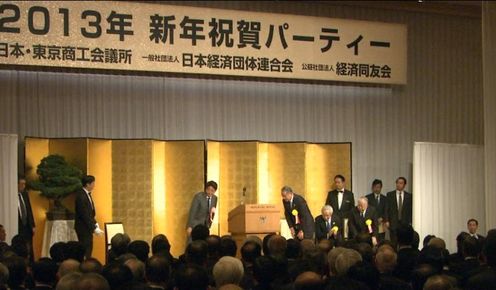Home > News > The Prime Minister in Action > January 2013 > 2013 New Year Party Jointly Hosted by the Three Economic Associations
2013 New Year Party Jointly Hosted by the Three Economic Associations
Monday, January 7, 2013

Photograph of the Prime Minister delivering an address at the 2013 New Year Party Jointly Hosted by the Three Economic Associations 1

Photograph of the Prime Minister delivering an address at the 2013 New Year Party Jointly Hosted by the Three Economic Associations 2
Prime Minister Shinzo Abe attended the 2013 New Year Party Jointly Hosted by the Three Economic Associations held in Tokyo.
The Prime Minister said in his opening address,
"I am on this stage for the first time in six years. This is the year of the snake in the Chinese calendar. I have a feeling that I have also cast off my skin, and am confirming my determination to establish a stable administration. I would now like to explain briefly the basic policies of the Abe administration.
The basic policy is the creation of wealth through growth.
It is companies that actually create employment, make products and securely pay money and salaries to the employees.
It is a matter of course that the level of salaries will not be raised without the growth and increased revenue of companies.
The Abe administration will go back to this starting point. We are considering achieving growth of the Japanese economy, creation of employment and increase in distribution by allowing your companies to exert efforts, and to create an environment in which it will be easy for you to do so.
In addition, the Abe administration is determined to listen to your voices from the industry, aiming to win in global competition.
What we prioritize highest is to achieve significant results rather than giving hundreds of hollow words. We will put the top priority on speed, decisiveness, and implementation.
Regarding the management of the economy, we must overcome deflation and yen appreciation. In order to do so, we are considering achieving economic growth with the "three prongs," namely, bold monetary policy, flexible public finance policy, and a growth strategy that encourages private sector investment. Specifically, we will break out of deflation, correct the yen appreciation, achieve economic growth, and promote the creation of employment and investment by companies. We will also put our utmost efforts into revitalizing exhausted local economies, and to support small- and medium-sized enterprises.
In order to implement these policy measures, we will start the Headquarters for Japan's Economic Revitalization, and restart the Council on Economic and Fiscal Policy in the near future. We will compile urgent economic countermeasures by the end of this week, and based on them, will submit a large supplementary budget to the Diet. We are currently engaged in this work, including the preparation of the budget for FY2013, giving up our year-end and New Year holidays. Carrying forward the final work on a fast track, we aim for deciding the governmental draft plan by the end of January.
In order to achieve and implement the growth strategy, we will soon inaugurate the Industrial Competitiveness Council, so as to gather the wisdom in both the public and private sectors. This should be a place not to merely draw ideas and visions, but for discussing how to specifically give shape to the growth strategy.
First, we must recover the manufacturing industry of Japan that can win in global competition. We will also carry forth bold measures to develop a service industry with high added values. We call this the Japan Industry Rebuilding Plan. In addition, we will identify the areas wherein national issues can be resolved and such solutions can be applied throughout the world, and implement and realize a new targeting policy.
As for the international development strategy, we are expecting to implement the "Cool Japan" strategy, which takes in the growth of the Asian economic zone and support strategies to market contents that capitalize on the advantages of Japanese culture and Japanese foods abroad, as well as to expand exports in the area of agriculture.
I believe that agriculture is an area of growth. Currently, in the area of food, export and trade industries are achieving steady growth in Asia. Unfortunately, Japan has not been able to expand its market share in this area. Despite such delicious, safe, and healthy foodstuffs, Japan is not fully taking advantage of such potential. I would like to boldly change this area as an industry to export products.
I am also planning to strategically carry out the international standardization and international support strategy to diffuse the superiority of Japanese technology to the global market as a diplomatic soft power. The most important key to reinforce industrial competitiveness is regulatory reform and innovation. Consequently, we will establish the Regulatory Reform Council and the Council for Science and Technology Policy in liaison with the Council on Industrial Competitiveness. I would like to ask for your cooperation in gathering the wisdom of industry also in these occasions.
Recovery and reconstruction of the disaster-stricken areas are also a top prioritized issue. Many people are still being forced into a lifestyle fraught with inconveniences in the disaster-stricken areas. We strongly believe that without the reconstruction of Fukushima there can be no reconstruction of the disaster-stricken areas, and that without the reconstruction of the disaster-stricken areas there can be no revival of Japan. Although the ministries and agencies are working earnestly, their effort is within a vertical segmented structure, so I will eliminate such segmentation.
I will make fundamental changes in the mechanism so that the civil servants themselves go out to see the municipalities and the frontline, and make judgments and decisions on-site. I will boldly change the awareness of the Reconstruction Agency to change the organization into a place to concentrate every energy in figuring out how to overcome barriers and move reconstruction forward, rather than spending energy on figuring out why we cannot do this or that. Through such change, we promise to speed up reconstruction and make achievements.
The situation surrounding Japan is severe. This can be said in the area of economy, as well as in the area of education. Above all, the situation of foreign and security policy is very severe. We must gather the wisdom of the ruling parties, and also win cooperation from the opposition parties, as I recognize many members here today, to achieve results through 'politics that can decide.' This is precisely the year for the revival of Japan. I am determined to make this a year when, looking back five or ten years from now, we can realize that the revival of Japan started from this year."

